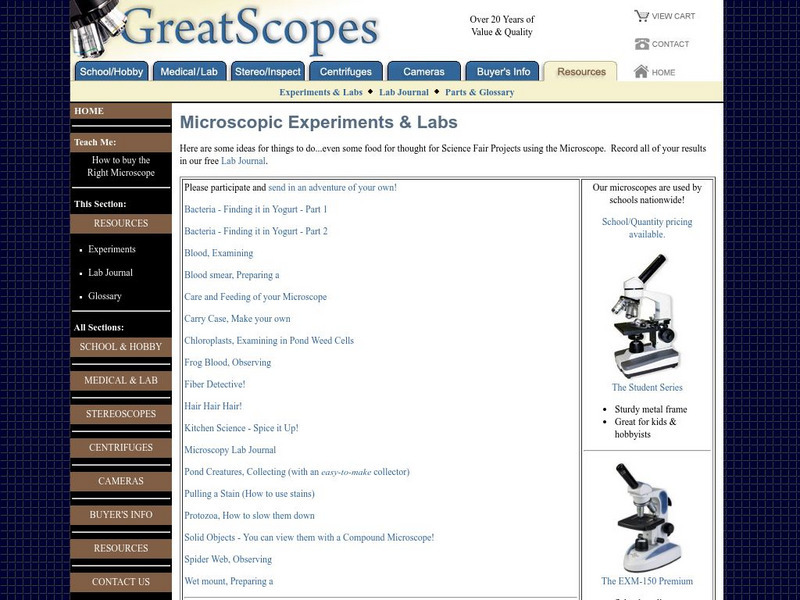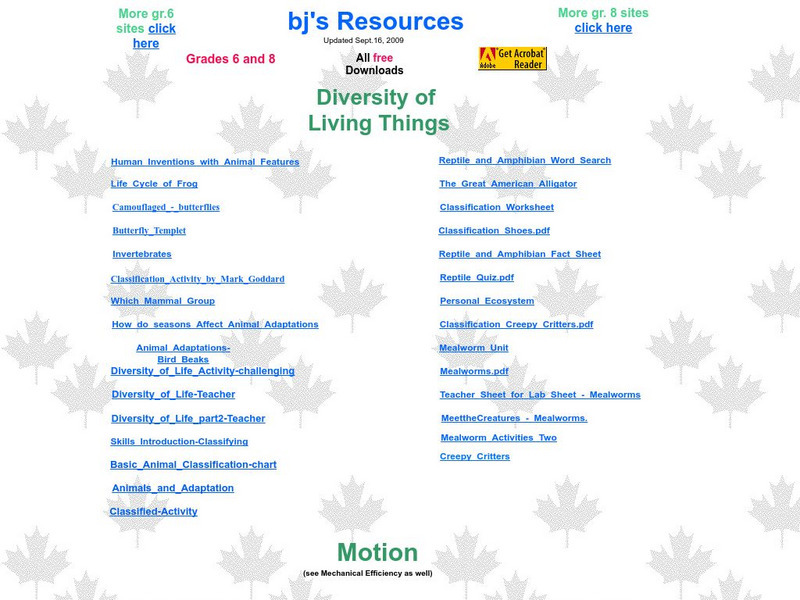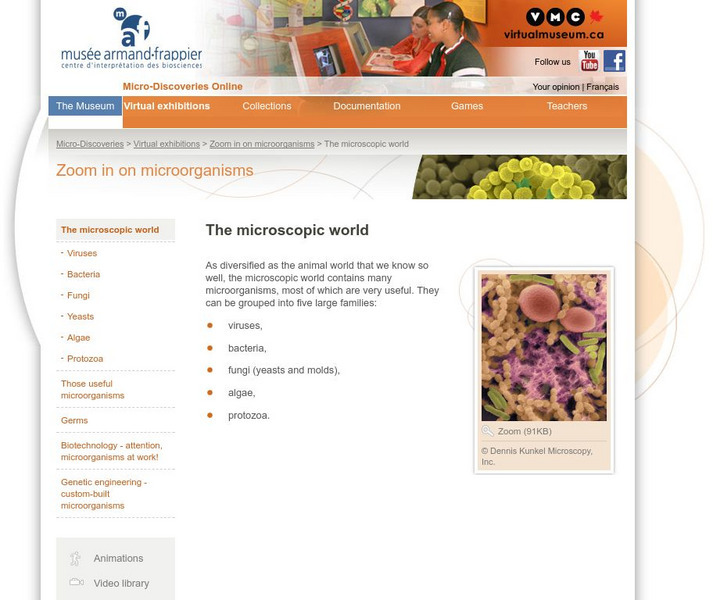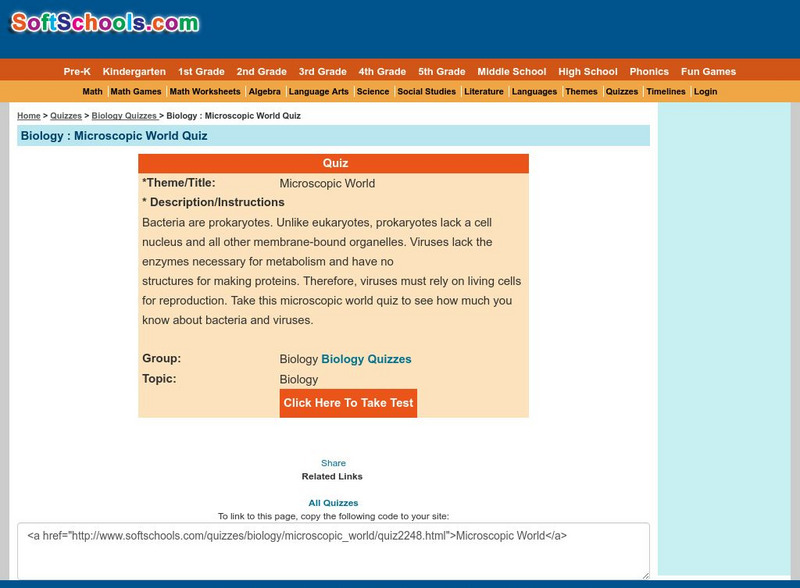Curated OER
Nanaotechnology: Small Science, BIG DEAL!
Learners read an article that introduces them to the science and applications of nanotechnology. They discuss the the everyday examples of how nanotechnology is and can be used. In small groups, they observe and make inferences about...
Curated OER
Your Kidneys
In this kidneys worksheet, students review the structure and function of the kidneys in the human body. This worksheet has 18 fill in the blank statements.
Curated OER
The Effect of Automobile Exhaust on Hydra in an Environmental Chamber
Young scholars study the structure and habitat of the hydra in this lab lesson. Students determine if the hydra can be used as an indicator to detect pollution from automobile exhaust.
Curated OER
Biological Communities
Students identify consumers and producers in different communities. Students collect a variety of soil samples and record organisms found in the samples.
Curated OER
Relationships and Biodiversity
Learners examine diversity on the planet and the differences within a species. In this investigative lesson students complete a lab that allows learners to better understand the relatedness between plants.
Curated OER
Microorganism Multiplication
Seventh graders complete two experiments to learn about harmful and helpful microorganisms. In this microorganisms lesson, 7th graders read background information about fungi, yeast, and club fungi. Students then complete two experiments...
Curated OER
Cell Community
Seventh graders use technology to review cell structure and function. In this cells less, 7th graders review the parts and functions of a cell, and use photography/video and PowerPoint to enhance their explorations.
Curated OER
Sand Castles: Pre-engineering 101
Students examine how soil holds together and what the effect of particle size and water content is on soil. For this engineering lesson students complete a lab, record their observations and discuss what they learned.
My Science Site
Life Systems: Cells, Tissues, Organs
Extensive site for teachers provides some helpful resources that pertain to plant and animal cells. Includes a microscope diagram as well as plant, animal and pond labs. Also contains links to structures and mechanisms, matter and...
Lawrence Berkeley National Laboratory
Berkeley Lab: The Particle Adventure: Wavelength, the Cave
This analogy story explains the manner in which the wavelength of light affects the maximum resolution of a microscope.
Other
Armand Frappier Museum: Micro Discoveries Online: The Microscopic World
This comprehensive exhibit focuses on the wonders of microorganisms, what they are, how they can affect our daily lives, and how they can be manipulated. Videos, games, and animations are included. Teacher resource link explains each...
My Science Site
Bj's Science: Microscope Diagram [Pdf]
Site is simply a picture of a microscope that has numbers that correspond with each part of it. No answers are provided. A good reproducible if you are looking for a detailed view of the different microscope parts.
My Science Site
Bj's Science: Microscope Test [Pdf]
Site is a brief test teachers can use to assess student knowledge of a microscope. No answers are provided.
My Science Site
Bj's Science: Microscope Word Search [Pdf]
Site provides a helpful word search teachers can use to help their students familiarize themselves with a microscope and have some fun at the same time.
Soft Schools
Soft Schools: Microscopic World Quiz
Take this interactive, multiple-choice quiz over microorganisms, then review your score and any missed questions at the end.
NPR: National Public Radio
Npr: From Microscopes to Large Scale Sculpture
This site is about the microbiologist turned artist, Kendall Buster turns what she sees under the microscope into oversized sculptures.
ClassFlow
Class Flow: Contributors to the Study of Light
[Free Registration/Login Required] This flipchart is intended to give a brief description of 4 people who contributed to the understanding of light through the use of microscopes and telescopes: Leeuwenhoek, Hooke, Galilei, and Newton.
Other
Xtalent Art Gallery: Nanoworld Image Gallery
Microscopic gallery of various organisms and objects.
Curated OER
Using a Compound Microscope (Photo by Paul Billiet)
This site is a step by step instructions on how to use a microscope. Begins with the proper way to get the microscope and ends with putting the microscope. The correct way to look at slides and care for you microscope are also discussed....
Curated OER
Compound Microscope Showing the Stage and Spring Clips
This site is a step by step instructions on how to use a microscope. Begins with the proper way to get the microscope and ends with putting the microscope. The correct way to look at slides and care for you microscope are also discussed....
Curated OER
A Compound Microscope
Learn how to calculate the total magnification of a microscope on this concise site. Links to making a slide, questions on the use of the microscope, and other related microscope topics are included on this site.
National High Magnetic Field Laboratory
Magnet Academy: Gerd Binnig
Gerd Binnig co-developed the scanning tunneling microscope (STM) with Heinrich Rohrer. The STM allowed scientists entry into the atomic world in a new way and was a major advance in the field of nanotechnology. For their achievement,...
Wikimedia
Wikipedia: Anton Van Leeuwenhoek
This site from the Wikipedia encyclopedia provides a concise explanation of van Leeuwenhoek's (1632-1723 CE) contribution to the improvement of the microscope and his contributions to cell biology.














![Bj's Science: Microscope Diagram [Pdf] Activity Bj's Science: Microscope Diagram [Pdf] Activity](https://static.lp.lexp.cloud/images/attachment_defaults/resource/large/FPO-knovation.png)





